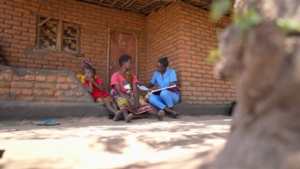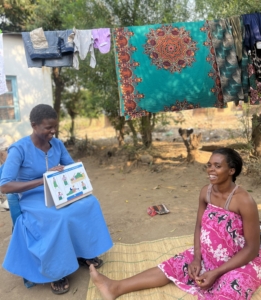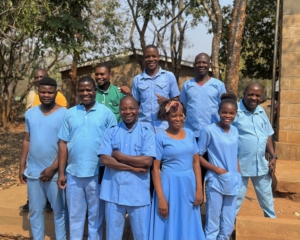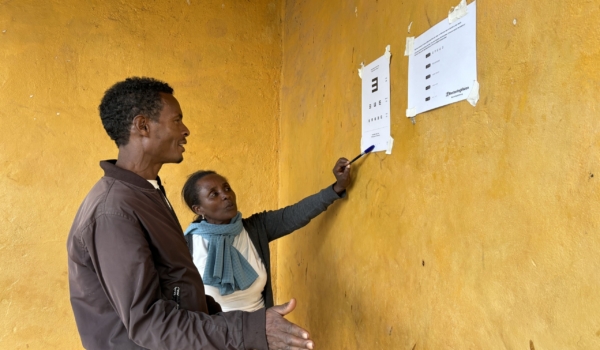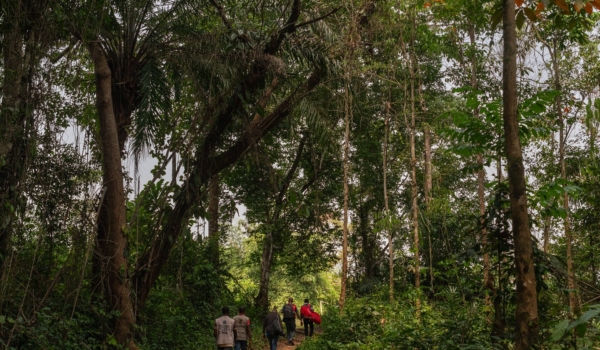Outside Changoima Health Post in Chikwawa District, Malawi, neighbors watch as the community’s chief and elders recognize three women with the title of “secret mother.” The women—Elifa Ndege, Anastasia Divala, and Hilda Mbendera—are respected members of the community, trustworthy, and invested in the needs of others. And as secret mothers, they are a critical bridge between expectant mothers and the community health workforce.
In Malawi, where 83% of the population lives in rural and remote communities like Changoima, Last Mile Health partners with the Ministry of Health, training community health workers to deliver standardized, high-quality primary care. Community-based maternal and neonatal care is a training priority: Malawi has one of the highest maternal mortality ratios globally, estimated at 5.7 maternal deaths per 1,000 live births,* and neonatal mortality is estimated at 29 per 1,000 live births.** Recent training has focused on equipping community health workers to encourage pregnant women to access frequent antenatal care and make a plan to deliver at a health facility. Identifying pregnant women is a critical first step in this process—but fear, uncertainty, and unfamiliarity with the formal health system often prevent women from seeking care.
This is where secret mothers step in.
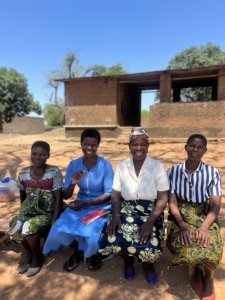
Community health worker Mary Namboya (second from left) with secret mothers Anastasia Divala, Elifa Ndege, and Hilda Mbendera.
“The main problem is that many pregnant women wait until they are eight months pregnant before deciding to visit the hospital for antenatal checkups,” shares Mary Namboya, a community health worker who works closely with secret mothers in Changoima. This is mainly a product of deeply rooted cultural and religious beliefs—and can result in danger or death to mother or child. In addition, Mary shares, many women feel they must wait for their husbands’ approval before seeking care.
As cultural beliefs intertwine with gender dynamics, secret mothers help bridge the gap between patients and the health system. Community leaders identify older women to serve in the role, chosen for their caring and friendly demeanor coupled with their strong desire to help others. As experienced members of the community (and usually mothers themselves), secret mothers are trusted by younger women—and respected by husbands and community leaders. They identify and connect with pregnant women, breaking down fears about formal healthcare and encouraging expectant mothers to connect with community health workers as soon as possible.
“Secret mother volunteers are a crucial structure in the community which help community health workers raise community awareness by explaining to women, male partners, their relatives, and the community gatekeepers the importance of receiving early antenatal care, thereby helping to increase first trimester coverage,” says Sophie Chimwenje, Malawi’s national coordinator for community-based maternal and neonatal care within the Ministry of Health’s Reproductive Health Directorate. “They assist in identifying pregnant women and girls for trained providers to visit. They also identify danger signs during pregnancy, after childbirth, and in newborns, and they link women to community health workers for timely referral. They also help in explaining the importance of birth and complication readiness and where to seek childbirth and postnatal care services.”
Secret mothers’ deep ties to their communities mean they know how to connect with their neighbors—even when the topic is deeply personal. “As secret mothers, we interact with other women so that we find out who in the village is expecting. We usually interact with these women at the maize mill, church, or by the well,” explains Elifa. “We approach them in a respectful and friendly manner so that they open up to us and tell us who is pregnant.”
When they visit the women their neighbors have identified, sensitivity and humor help the secret mothers earn their trust. “We say, ‘We have come here by the chief’s delegation and as secret mothers with much wisdom and experience. This tummy bump cannot just be the eating of a sweet potato!’” Elifa recounts. “The pregnant woman laughs. We come in peace so that they open up to us.”
Once a woman confirms her pregnancy, says Anastasia, “We ask, ‘So now that you know this, what are your next steps?’ Most say, ‘I will just stay at home until it is time to give birth.’ We change their mindset on this by sharing the benefits of hospital deliveries. For example, a pregnant woman bleeding profusely cannot be assisted properly and in good time if delivery is done at home. We also encourage them to meet community health workers and seek medical help via antenatal visits.”
Community health workers like Mary have come to rely on secret mothers. “We have community gatherings and coordinate with village committees, chiefs, and secret mothers. All those involved in healthcare in our community share the benefits of hospital deliveries, and the issues to do with harmful cultural practices are also addressed there,” Mary explains.
Responding to health issues in Changoima is a collaborative effort, and secret mothers are a crucial thread in the fabric of the community. Mary and other community health workers have observed an increase in antenatal visits and more women open to receiving counseling and support during their pregnancies. “The secret mothers are helping us a lot,” she says. “In the past, there were lots of home deliveries, but now working with them has reduced home deliveries. Pregnant women now know the benefits of hospital deliveries.”
For Elifa and her fellow secret mothers, their role is clear—and so is their mission. “We want women to share their experiences freely as we also share the importance of antenatal visits and hospital births,” says Elifa. “I want to ensure we reduce maternal deaths.”
*Source: USAID
**Source: USAID

